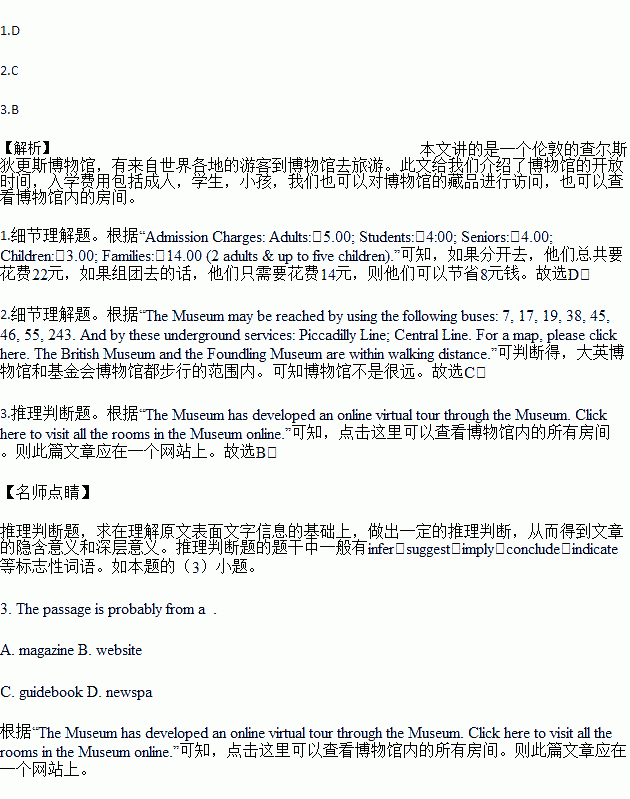题目内容
The Museum: The Charles Dickens Museum in London is the world’s most important collection of material relating to the great Victorian novelist and social commentator. The only surviving London home of Dickens (from 1837 until 1839) was opened as a museum in 1925 and is still welcoming visitors from all over the world. On the four floors, visitors can see paintings, rare editions, manuscripts, original furniture and many items relating to the life of one of the most popular and beloved personalities of the Victorian age.
Opening Hours:The Museum is open from Mondays to Saturdays 10:00-17:00; Sundays 11:00-17:00. Last admission is 30 minutes before closing time.
Special opening times can be arranged for groups, who may wish to book a private view.
Admission Charges: Adults:£5.00; Students:£4:00; Seniors:£4.00; Children:£3.00; Families:£14.00 (2 adults & up to five children).
Group Rates: For a group of 10 or more, a special group rate of £4.00 each applies. Children will still be admitted for £3.00 each.
Access: We are constantly working to improve access to the Museum. Our current projects involve the fitting of a wheelchair ramp(活动坡道)for better access and an audio tour for visitors with impaired vision. Our Handling Sessions (亲身体验活动) are also suitable for the visually impaired. The Museum has developed an online virtual tour through the Museum. Click here to visit all the rooms in the Museum online.
Hire the Museum: The Museum can be hired for private functions, parties and many other social occasions.
Find Us: The Museum may be reached by using the following buses: 7, 17, 19, 38, 45, 46, 55, 243. And by these underground services: Piccadilly Line; Central Line. For a map, please click here. The British Museum and the Foundling Museum are within walking distance.
1.Compared to going there separately, if a family with two adults and four children go to the Museum together they will save______.
A. £22. 00 B. £14. 00
C. £11. 00 D. £8. 00
2.According to the passage, which of the following statements is true?
A. Anyone cannot hire the Museum for other uses
B. Visitors with poor vision cannot enjoy the Museum
C. The Museum is not very far from the British Museum
D. In any case people cannot visit the Museum after 17:00
3.The passage is probably from a ______.
A. magazine B. website
C. guidebook D. newspaper
随着人们的生活水平越来越高,有不少人忽视了体育锻炼。你班学生就这一话题组织了一次班级讨论, 请对以下列举的体育锻炼的好处进行补充,并说说自己所喜爱的运动项目。
体育锻炼的好处 | 对身体有好处; 能够缓解压力; …… (至少补充两个要点) |
你喜欢的运动项目 | (请加以说明) |
【写作要求】
1.作文中不能出现真实姓名和学校名称;
2.不必写标题;
3.词数150左右。
【评分标准】
内容完整,语言规范,语篇连贯,词数适当。
____________________________________________________________________________________________
____________________________________________________________________________________________
____________________________________________________________________________________________
____________________________________________________________________________________________
____________________________________________________________________________________________
____________________________________________________________________________________________
____________________________________________________________________________________________
________________________________________________________________________


